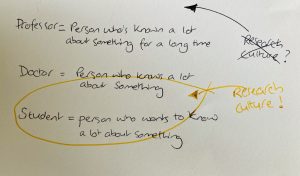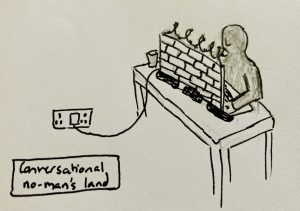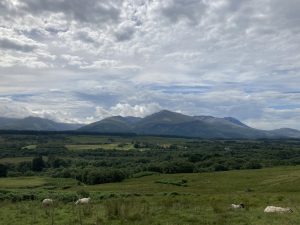August 14, 2024, by bbztlg
Lurk, listen, click: making connections at the Research Culture Conference
Lauren Colley, postgraduate researcher in English, shares her honest and refreshing insights as she looks back on her experience of attending the Research Culture Conference. She reflects on making useful networking connections and finding support for her wellbeing project.
I am the mystery shopper of the conference world, and what I’ve just discovered is that writing about the social experience of a conference, as opposed to its content, makes you look at it very differently.
You pay more attention to peoples’ faces; note those who’ve sneaked their phones out, who’s erected the handy little defensive parapet of a laptop, and who has that look of rapture that titles such as ‘Professor’ sometimes seems to conjure.
However accurate, academia has a built in hierarchy in this respect:
Doctor = a person that knows a lot about something.
Professor = a person that knows a lot about something and has done for a long time. The knowledge veterans, collectors and accumulators.
Then there’s the student = someone who wants to know a lot about something.
Networking is about matching up your something with their something.
Perhaps there will come that bubbling enthusiasm that has you itching to make notes; perhaps you will seek that person out, babble digressively, pose questions, all with the compulsive need to extract some of this person’s something in order to what?
Make your something bigger? Wider? More socially engaged? Welcome to knowledge exchange – but more on that later.
As the mystery shopper I am looking for the ‘clicks’ in the room. Someone finishes speaking and a click is an engaged question that makes the session run over; a click is the one that sashays over after, lingers to one side for a clear path to open up. To me, a room, day, month of clicks is what research culture means (a word of conference-going advice here: pick your moment – don’t stand in the way of anyone getting to the buffet).
I’m fortunate today: I score my first click at 8.58am – a shout out to Michelle Thind from the Researcher Academy Placements Team who (I hope she doesn’t mind me saying) has, like me, done some dodgy jobs in her time. I’m glad I’m not the only one who got rejected from Primark, who has discovered the hard way exactly how hard cleaning up after students is.
Our humorous banter had a purpose: the seeds of an idea for a future placement, and – hurrah! – my first business card, because, sorry to all the environmentally-friendly initiatives the University aligns with, this paperless lark just isn’t for me.
I happen to really like paper.
Three minutes and one slide…
…is all a flash presentation allows. I’ve never personally delivered one but the most skilled are the ones that don’t appear to be in a hurry. The ones that dare to leave pauses and don’t over-clutter their single slide. Back-to-back though, no matter how skilled the delivery, I note one of the major complications of university life, because a transcription of any of these talks would probably be about as understandable as Morse code or pig Latin. Why? The acronym epidemic that’s broken out over the last decade.
What would Dickens make of KE within the PGR and ECR culture? The Director of R&I Strategy uses words like ‘accessibility’, ‘inclusivity’, ‘diversity’ and ‘engagement’, yet interspersed with RA and ER and PRES?
Flash presentation number 6: the dual-manned ‘wellbeing’ talk has set my click radar quivering, and at some point, I’ll mosey their way.
But right now it’s time for…
Break out rooms
Woohoo – out comes the flip chart paper! And I am back in the game. The only problem is the lack of tables. This, after all, is a building where people stand up and talk and others sit and listen. It’s less well-equipped for the casual and commonplace, which is why I find myself kneeling on the floor looking up the nostrils of my five-person discussion huddle, trying not to think how symbolic this is of my personal imposter syndrome.
What quickly emerges is a certain degree of cynicism regarding the ‘Research Culture Strategy Vision’ briefly introduced just an hour earlier (though I’m sure others might have had the foresight to view this beforehand were it available). The main problem is how long a long view of the University’s trajectory it covers. In fact, seeing ‘2034’ on the PowerPoint feels oddly futuristic, especially when we’re all just beginning to debate, accept, understand or just plain battle the coming of AI.
The ‘Vision’ is well padded out with motivational buzz words: ambition, value, collaboration, transformation, values. That all sounds lovely, but there is a distinct lack of tangible examples as to what will get our institution there, nor how it will be measured. Or as one professor points out, it lacks the ways, ends and means that are the very definition of strategy.
Another concern is that in the meantime, the withdrawal of PGTA positions (acronym alert: Post Graduate Teaching Assistants) from the pandemic onwards has left the University gradually eroding its body of PGR s who want to pursue academic teaching roles within the University. Without the PGTA funding, graduates are starting to look elsewhere, whilst the work load of marking and tutorials is increasingly dumped at the feet of more experienced academics.
I’ve banged my head against this particular barrier for a while now. Having worked my way through all the TLDP and requirements for TLOC (translation: Teaching and Learning Development Program and Teaching and Learning Observation College), I want to teach, but can’t even do so on a voluntary basis due to the potential for ‘exploitation’ (NB: I’m completely open to exploitation if it gets me the experience I need). It seems increasingly possible that I might pop out the end of my PhD with a load of training, but next to no experience.
Trundling along, hanging around, waiting for the funding situation to change certainly won’t be an option for me for 10 years, and I don’t think I’m alone. Hence why conference clicks like my 8:58er might open up new avenues and opportunities.
What do we do well?
In an effort to remind us of both positive and negative, we’re asked the direct question as to what our School currently does well, and what it could do better. Everyone agrees that we’re good at collaboration within the arts, but less so with other disciplines. It’s also pointed out that we’re rubbish at actually communicating our successes on the University-wide stage where most STEM breakthroughs take precedence over STEAM (science, technology, engineering, art and maths) simply because they might be seen to have more immediate applications.
This is the first time I’ve heard of this STEAM notion, and as with so much of the language of the day, I find myself distracted by the curiosity of the concept. With the arts in tow, do people consider the cluster of research areas represented in this break out room as just a lot of hot air?
At least though we’re agreed on the importance of PGRs to research culture. But what exactly is going to cultivate that in the long term. Just some ideas included:
- A clear pathway that supports both careers within academia, and prepares – perhaps by way of placements or internships – students for whichever way they hope to move. At the moment, we depend largely on a combination of opportunism, academic profile and sheer persistence.
- Mentors, aims, experience
- More collaboration, plus the willingness to shout our successes a little louder.
For many, these conversations could quite easily degenerate into rants, and the solution to this is to note the time and head for the buffet queue.
The hoffet or huffet?
There’s something contradictory about a hot buffet. However nice its offerings, they are decidedly time sensitive. Sandwich triangles and quaint pastry parcels sandwich will survive any number of long conversations, mashed potato won’t.
Plus, the cakes are cleverly unbaggable – no pastries for the bus journey home here.
I admit I am far from comfortable in this situation. In fact, it’s the part of the day I’ve been dreading. As the queue snakes round to the mystery tureens, each manned by a spoon-wielding waiter, I panic and choose wrong: I choose soup.
No, Lauren! Why? Because it was self-serve, veggie, had the shortest queue and, well, it was there. Now I re-discover that soup is not a graceful meal, or at least only in the politely soundless slurpings of a Jane Austen novel. But, it’s a little late now, so I scuttle round the corner and duck beneath the parapet of my laptop.
Perhaps this ought to be ‘networking time’, but its more usefully time for the collecting of thoughts, morning musings and speculations. An apt time to embark on my mission to find the Wellbeing team. I’m sure they’ll fix everything.
And they do! (Click) How? By helping me promote the Eating Disorder Support group I set up several months ago now, which might also explain, or at least offer some reason for the sense of impending doom that comes with the queueing, gathering, selecting and milling demands of a buffet table.
Epilogue
I’ve always wanted to be in the position to write an epilogue. Ideally at the end of my own book, but this will do for now.
It’s a note that comes a good 10 days after the Research Culture Conference as I exploit the patchy wifi of what, truth be told, is little more than a hut on the edge of the Outer Hebrides. In preparing to come away I thought the same pie-in-the-sky thing I think every time: “Great, lots of unpeopled time and long journeys in which to get some work done.” However, after seven hours on a small boat, visiting the bird-encrusted islands of St Kilda, I have never felt more detached from my own project, and even when I get home, I know the only place that could get me writing again is the University campus itself.
For me, and I think probably quite a lot – maybe even a majority – of researchers, a geographical location, or specified ‘place of work’ is a necessary part of their personal research culture. Whilst I love the ethos of anywhere-anytime learning, the Open University structure has never appealed to me. Like the music of an open-air concert, it feels less immediate, as though something of its energy is dissipated to the shared air around it.
Although my brief was to write about the conference, what formed in its aftermath was a renewed understanding of the University as one giant ecosystem. This includes the campus itself as a place and time in which to anchor my work. The birds, boats, books and busyness; the likelihood that I’ll spend money in Blackwells just by walking past the entrance on my way to over-priced coffee (which yes, I could get in the PGR offices, but it’s not the same, not the culture); the pin boards cluttered with call outs for willing participants, event invites and cake sales all attest to how much of a beehive an institution really is.
The ‘vision’ presented at the opening to the conference feels somewhat irrelevant to all that. For me, research, whether in the arts or sciences, STEM or STEAM, is relevant to now, and research culture relies on us investing in our now and seeking out the clicks that might lead in unexpected but exciting new directions.




Great read. The hoffet or huffet very relatable.
I could relate to this clever, well-written piece in so many ways, especially about the value of the university as one giant ecosystem. I’ll look forward to reading your future essays.
Great post, really fascinating insight into a conference. JC
Well done, again, Lauren
I like the STEAM, concept. For me, the A is an optional extra, but if it explains why this engineer likes classical music, that’s ok.
Student definition. Hmmm! Could add the words “ or anything” at the end.
Research Culture Strategy Vision!! (RTSV). OMG. Who dreamt this one up, or should I ask “how many did it take”?
And I liked what that one professor pointed out too.
Sorry about your buffet choice, and I’d like to hear a little more about your Outer Hebrides trip. St. Kilda is a football team (Australian football that is) over here.
Cheers
I really enjoyed reading Lauren’s article and thought about my own experiences of the ‘social’ as opposed to the ‘content’ of a conference. Sometimes thought provoking- a click, or a bit lonely with my mind wandering to lunch, Lauren’s description of this made me smile.
St Kilda is on my bucket list so I’m envious of this trip but I can imagine it would be distracting from getting any work done.
A really interesting and insightful critique on conference life and one which is familiar to me from a previous life.
I have always called into question the value of conferences and the content was very thought provoking.
I really like Lauren’s style which combines good analysis with humour.
Thanks Lauren!
All rings bells. I hate acronyms!